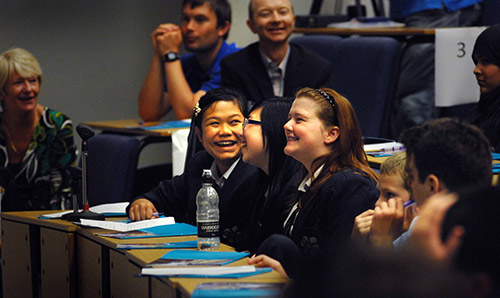Secondary schools and colleges

From showing demonstrations to Year 7 students to A-Level masterclasses on the latest research, we want to engage students of all ages with the exciting study of physics.
We have a deep well of talent in our Department, and we welcome opportunities to share it with local schools.
Some of our specific activities are listed below. We're also flexible with regard to other workshops, talks and campus visits - just get in touch.
Work experience
Until summer 2019 we offered a Y12 work experience week in the Jodrell Bank Centre for Astrophysics. Unfortunately this programme is no longer running, and we're unable to offer any work experience placements within the Department of Physics & Astronomy other than a limited number of Nuffield research placements.
You can see some information on other work experience opportunities in the University at the Schools and Colleges site.
Nuffield research placements
The Nuffield Foundation offers over 1,000 four to six-week summer placements in STEM subjects each year, giving students over 16 the opportunity to work alongside professional scientists.
One Day Schools
Our One Day Schools in Physics events are held on campus and involve a series of talks, repeated over two consecutive days, which illustrate various aspects of physics and astronomy research. The talks are given by world experts in theoretical physics, particle physics, nuclear physics, astronomy and other branches of physics, which vary from year to year.
Students will hear about the latest curiosity-driven, fundamental research on the origin and nature of the Universe around them. In addition, they'll be able to see why physics is an important and relevant subject, and how it affects people's everyday lives in technological application.
Held every summer, the event is intended for sixth formers studying AS or A2 in physics and complements the A-level curriculum.
The safety and wellbeing of our staff, students and visitors is our highest priority. To help keep everyone safe during the COVID-19 outbreak, we have moved teaching online, closed non-essential facilities and cancelled or postponed on-campus events. One Day Schools in Physics will therefore not be held in 2020.
Masterclass sessions
We run 'masterclass' sessions for Year 12 students and their teachers. These focus on a particular area of physics and consist of talks by researchers and hands-on practical sessions.
Our masterclasses have had to be paused for 2020 due to the COVID-19 schools closures, but information and dates for the next sessions will be added when available.
The Particle Physics Masterclass has run since 1997 and has engaged thousands of students. This event is primarily intended for those students taking modules which include particle physics, but is also open to any physics student or teacher interested in studying or teaching the subject. The Masterclass consists of a mixture of talks given by researchers in the Particle Physics Group and hands-on practical sessions.
The Nano Masterclass is a one-day event specifically designed for Y12/13 students and their teachers and run at The University of Manchester by practising researchers from our Graphene NOWNANO Centre for Doctoral Training. This is a unique centre run by specialist academics and working alongside more than 120 graphene researchers at The University of Manchester, in partnership with Lancaster University, focusing on research and innovation in the field of nanomaterials.
Lectures in your school
Schools and colleges within an hour's travel from the University campus can request an academic lecture on a number of different physics topics and for a range of year groups. Some of our titles include:
- Filling up on Sunshine: Solar Energy and Solar Fuel
- Liquid crystals
- Cosmic explosions
- Blood, guts and lasers
- Evacuation, Evolution, Epidemics, Economics - the science of agent- based models

